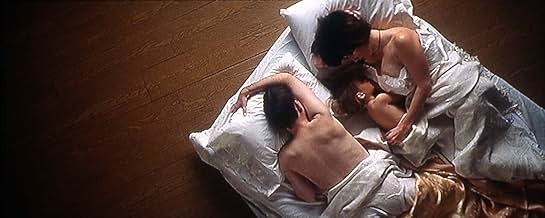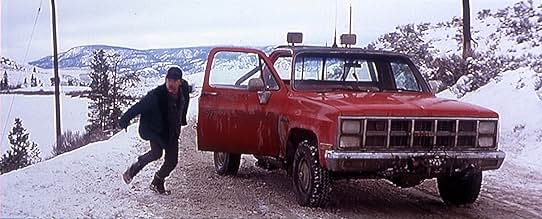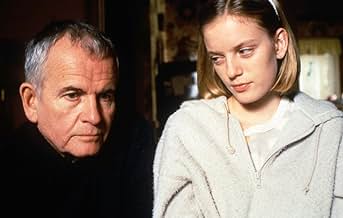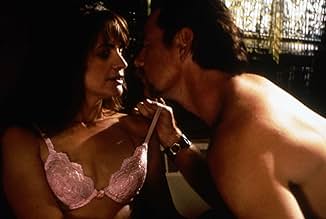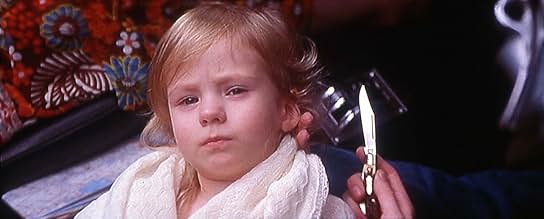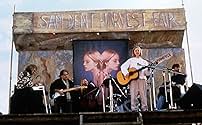Un accident de bus amène un avocat dans une petite ville pour défendre les familles, mais il découvre que les choses ne sont pas tout à fait ce qu'elles semblent être.Un accident de bus amène un avocat dans une petite ville pour défendre les familles, mais il découvre que les choses ne sont pas tout à fait ce qu'elles semblent être.Un accident de bus amène un avocat dans une petite ville pour défendre les familles, mais il découvre que les choses ne sont pas tout à fait ce qu'elles semblent être.
- Réalisation
- Scénario
- Casting principal
- Nommé pour 2 Oscars
- 34 victoires et 56 nominations au total
Avis à la une
The central idea (a school bus crash) has such intrinsic emotional repercussions that I can see how most viewers are washed away in grief enough to not notice the emptiness of the conceit built around it.
As an intruding lawyer, Ian Holm is asked to give a performance of staggeringly self-conscious falseness in which his every word, movement and breath is meant to project "SOMETHING IMPORTANT". His episodic encounters with the people of the community in which the accident took place only reveals Egoyan's total condescension toward life's "little people", presenting them as simpletons who, gosh darn it, love their children and each other and turn their noses up at anything so disgusting as a dollar bill.
In a failed attempt to make at least one character two-dimensional, a subplot is slopped on about the lawyer losing touch with his own child, the most ridiculous drug-addicted banshee every put on film.
Toss in heavy-handed allegories, heart-tugging muzak and trite conclusions, and what have you got? An award-winning "masterpiece", to hear most people talk. More likely they woke up the next morning, remembered something about angelic children heading for their final bus ride, and forgot the manipulative banality of the rest.
View the first episode of Krzysztof Kieslowski's 1988 "Decalogue", which covers similar thematic ground and, in 50 short minutes, accomplishes worlds more.
3 out of 10 for nice work by actors Bruce Greenwood and Sarah Polley.
The grieving parents are visited by a no win no fee lawyer, Mitchell Stevens (Ian Holm.) He is a partner in a law firm and he might be just doing his job but it seems to be without much vigour or conviction. I am not sure whether money is even a motivation for him. Stevens own daughter is a drug addict who only contacts him when she wants money for more drugs. Apart from that she hates him and he knows he has lost her.
He persuades some of the parents to file a class action lawsuit by claiming the design or construction of the bus was faulty.
The grieving parents and some of the survivors all have some secret. Did bus driver Dolores Driscoll (Gabrielle Rose) drive too fast or drive carelessly given the road conditions? Does Nicole Burnell (Sarah Polly) one of the kids paralysed below the waist might want to take revenge on her abusive father?
One of the parent, Billy (Bruce Greenwood) who was following the bus and waving at his children is against the lawsuit and wants the others to drop it.
The film does not start with the crash. It is told in non chronological order and we have several story strands. one of them is the use of 'The Pied Piper of Hamelin' which draws parallels of a town suffering from the loss of its children. Maybe Stevens will lead the townsfolk out of the darkness but he is suffering as well when he recounts his struggle with his drug addict daughter to one of her old friends he meets in a plane journey.
The film is about grief, sadness and the tortuous journey to recovery. Unfortunately the film does not always flow well and although I understand why some people would want to sue for damages, I never really understood why Billy did not want to sue? Nicole is paralysed, money would be useful to her and help her.
You could take a bus full of school children on any given day, in any part of the world, and observe the chaos that results after an appalling accident similar to the one presented here - but few outcomes would be the same after the despair, loss, rage and anger have subsided, and nobody would suggest it was fate. It is however, a beautifully performed picture, it leaves you reflective and thoughtful about the lives of the characters, how they became who they are and what they will become as a result. I don't buy the loss as a metaphor for the loss of the nostalgic view of the childhood of yesteryear either - that metaphor should be a celebration of opportunity. I would not want to curse myself with the childhood of my parents or similarly do the same to my own children.
The Sweet Hereafter is based on a novel by Russell Banks. This doesn't mean that Egoyan hasn't created a film that looks like his own creation. Very beautifully, even with a sense of poetry, the camera moves in a canadian small-town, a scenery full of snow. The nicely unusual music of Mychael Danna creates the mood when a lawyer played by Ian Holm arrives to the town. A School bus lies under ice, and the lawyer is invited to sue someone for the loss of several children.
A very important slice of the scenario belongs to a school girl (Sarah Polley), who realizes that the grief of loss can't be eased by judging the cause of it. Also the other people of the town play a remarkable role in the script.
Egoyan speaks clearly, but with a sound of personality, about the need of love, the pain of loneliness and the crossing of emotional obstacles. Fortunately someone knows how to direct interesting movies with elements of drama in them. The Sweet Hereafter possesses a brilliant structure where the visual telling breaths in the spirit of symbolism. I'm a very demanding viewer, a true cynic who always tries to find the worst sides of the film, but in this case I can't say anything negative.
What I found was less compelling than I expected. None of the characters were really engaging, and perhaps that's the aim of the film. But I honestly can't understand how this movie could have made people cry. Who did they identify with? Ian Holm's character, whose grimacing and silence set my teeth on edge, and whose attitude toward the families of the accident victims was so entirely self-serving? Sarah Polley's character, who almost never displayed any spark of life? And even if I had begun to identify with one character or another, I would have been instantly put off by the trite lines that kept coming out of their mouths. "Let me direct your rage?" Give me a break.
Not to imply too much of a connection between the films, but if you want to feel the terror and rage surrounding a tragedy as though you were there living through it, see "Boys Don't Cry." The words that go unsaid in that film are worth much more than those voiced-over or spoken all too clearly in "the Sweet Hereafter."
Le saviez-vous
- AnecdotesAs indicated on writer and director Atom Egoyan's commentary track on the DVD, many people ask about the odd mask worn by the notetaker during the deposition scene. This is a stenographer's mask, an item which is used in real life by a stenographer to record his or her own voice during the deposition.
- GaffesWhen Stephens visits the Ottos, and Mr. Otto offers him some tea, we hear a tea kettle whistling but the one we see on the wood stove is not the whistling type, and there is no steam coming from the kettle.
- Citations
Mitchell Stephens: I woke to the sound of Zoe's breathing. It was laboured. I looked over and noticed she was sweating and all swollen. I grabbed her, rushed to the kitchen, and splashed water on her face.
Alison: What happened?
Mitchell Stephens: I didn't know. I was in a panic. I guessed she'd been bitten by an insect, but there was no doctor. The nearest hospital was forty miles away, and Zoe was continuing to swell. Klara took her in her arms and tried to breast-feed her, while I dialed the hospital. I finally got a doctor on the line. He sounded young, but cool. He was confident, but there was a nervousness. He had been an intern. This was the first time he ever had to deal with anything like this. He wanted to seem like he knew what he was doing, but he was just as scared as I was.He surmised that there was a nest of baby black widow spiders in the mattress. He told me they had to be babies, or else with Zoe's weight she'd be dead. He told me I had to rush her to the hospital. He was alone. There was no ambulance available. 'Now you listen', he said, 'There's a good chance you can get her to me before her throat closes, but the important thing is to keep her calm.' He asked if there was one of us she was more relaxed with than the other. I said, 'Yes, with me.' Which was true enough, especially at that moment. Klara was wild-eyed with fear, and her fear was contagious. I was a better actor than she was, that's all. Zoe loved us equally then. Just like she hates us both equally now. The doctor told me that I should hold her in my lap, and let Klara drive to the hospital. He asked me to bring a small, sharp knife. It had to be clean. There was no time to sterilize properly. He explained how to perform an emergency tracheotomy. How to cut into my daughter's throat and windpipe without causing her to bleed to death. He told me there'd be a lot of blood. I said I didn't think I could do it. 'If her throat closes up and stops her breathing, you'll have to, Mr. Stephens. You'll have a minute and a half, two minutes maybe, and she'll probably be you can keep her calm and relaxed, if you don't let her little heart beat too fast and spread the poison around, then you might just make it over here first. You get going now', and he hung up. It was an unforgettable drive. I was divided into two people. One part of me was Daddy, singing a lullaby to his little girl. The other part was a surgeon, ready to cut into her throat. I waited for the second that Zoe's breath stopped to make that incision.
Alison: What happened?
Mitchell Stephens: Oh, nothing. We made it to the hospital. I didn't have to go as far as I was prepared to. But I was prepared to go all the way.
- Bandes originalesOne More Colour
Words and Music by Jane Siberry
Courtesy of Wing in Music/Red Sky Music
Arranged by Mychael Danna
Vocal by Sarah Polley
Performed by The Sam Dent Band
Meilleurs choix
- How long is The Sweet Hereafter?Alimenté par Alexa
Détails
Box-office
- Budget
- 5 000 000 $CA (estimé)
- Montant brut aux États-Unis et au Canada
- 3 263 585 $US
- Week-end de sortie aux États-Unis et au Canada
- 31 149 $US
- 12 oct. 1997
- Montant brut mondial
- 3 263 585 $US
- Durée1 heure 52 minutes
- Couleur
- Mixage
- Rapport de forme
- 2.35 : 1
Contribuer à cette page



